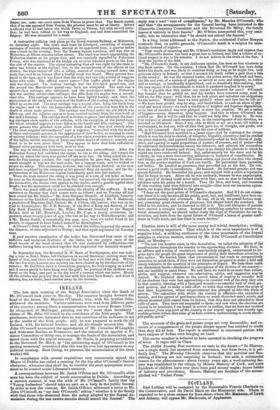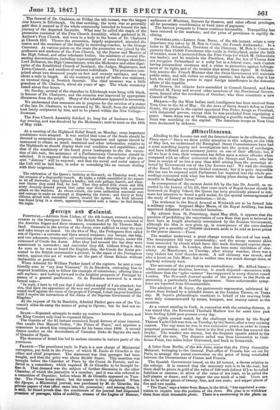SCOTLAND.
East Lothian will be contested by the Honourable Francis Charteria on the Conservative, and Sir David Baird on the Ministerial side. There is expected to be a close contest for Ross-shire; where Mr. Matheson, of Lewis and Aclutny, will oppose Mr. Mackenzie, of Applecross.
Th,e funeral cif Dr..Chalmere, on Friday the 4th, instant, was the largest
ever known in Edinburgh. On that morning, the town was so generally astir that it seemed as if the whole community intended to honour the last journey of the. departed favonrite. What may be called the staple of the procession consisted of the Free Church Assembly, which gathered in St. Andrew's Free Church, and went in a body to the house of Dr. Chalmers at Church Hill. Thence the procession, largely augmented, attended the hearse and the members of the family in mourning-coaches, to the Grange Cemetery. At various points on the route the procession was joined by the professors and students of the Free Church, by the Rector and Masters of the High School, and other scholastic bodies; the ministers of several Dis- senting denominations, including representatives of some foreign churches; Lord Belhaven, the High Commissioner, with the Moderator and other digni- taries of the Established Church of Scotland; the Judges, Magistrates, and Town-Council; and numbers of eminent individuals. The procession com- prised about two thousand people on foot and seventy carriages, and was about a mile in length. At the cemetery a crowd of ladies was stationed; an unusual thing in Scottish funerals. The chief mourner was a little grandson of Dr. Chalmers, about aix years of age. The whole ceremony lasted about four hours.
On Sunday, several of the churches in Edinburgh were hung with black, in honour of Dr. Chalmers; and the occasion was improved by appropriate discourses from the pulpit. Many of the inhabitants appeared in mourning.
We understand that measures are in progress for the erection of a statue of the late Dr. Chalmers, to be executed by Mr. Steell, from the admirable bust lately sculptured by him, and to be placed within the New College.— Scotsman.
The Free Church Assembly finished its long list of business on Tues- day evening, and was dissolved by the Moderator; next to meet on the 18th of May 1848.
At a meeting of the Highland Relief Board, on Monday, some important resolutions were adopted. It was settled that none of the funds should be devoted to emigration purposes; that the inspectors and agents should be inetructed to obtain as much statistical and other information relative to the Highlands as should display their real condition and capabilities; and that if the machinery of the board prove inadequate to the due execu- tion of this task, the assistance of a Parliamentary Commission should be solicited. It is supposed that something more than the surface of the pre- sent " distress " will be exposed; and that the moral and social nature of the Celt will be laid bare, in order to something like an earnest dealing with their exigencies.
The celebration of the Queen's birthday at Greenock, on Thursday week, was the occasion of a disgraceful tumult. At night, a rabble assembled in the square to let off fireworks; they lighted a bonfire, and stole palings, barrels, and what- ever timber they could find, for fuel. Then they pelted with stones and filth every decently-dressed person that came near them; finishing with a general attack on the windows. At eleven o'clock, the town authorities mustered men and courage to make an attempt at dispersing the rioters; and thirty or forty citizens, armed with constables' staves, cleared the square. An Irish labourer was found lying in a street, apparently wounded with a baton: he died during the night.



























 Previous page
Previous page